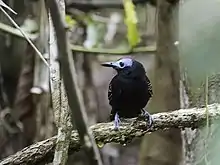Bare-crowned antbird
The bare-crowned antbird (Gymnocichla nudiceps) is a species of bird in the family Thamnophilidae in the monotypic genus Gymnocichla.
The bare crowned antbird is an uncommon species living in the lower Evergreen Forest from Belize to northern Colombia. Its scientific name is Gymnocichla nudiceps and it is a part of the Thamnophilidae family. According to ebird it is considered to be a scarce and shy type of antbird.[1] The typical adult male bird is black with an electric featherless blue skin color over its head and eyes and black feathers covering the rest of its body. The Antbird has white spots along its wings. While the female ant birds are fully reddish-brown, having a small bright blue patch of their skin covering their eyes similar to the males. The Bare-crowned antbird is found among Belize, Colombia, Costa Rica, Guatemala, Honduras, Mexico, Nicaragua, and Panama. Additionally, subtropical or tropical moist lowland forests are its natural habitat, and they are often found in swampy, poorly drained areas. According to birds of the world, the bare-crowned antbird is sulky, so the best way to spot this bird would be to listen to one of its songs, usually down-slurred chirping whistles. [2]
| Bare-crowned antbird | |
|---|---|
 | |
| Scientific classification | |
| Domain: | Eukaryota |
| Kingdom: | Animalia |
| Phylum: | Chordata |
| Clade: | Dinosauria |
| Class: | Aves |
| Order: | Passeriformes |
| Family: | Thamnophilidae |
| Genus: | Gymnocichla P.L. Sclater, 1858 |
| Species: | G. nudiceps |
| Binomial name | |
| Gymnocichla nudiceps (Cassin, 1850) | |
 | |
The genus Gymnocichla was erected by the English zoologist Philip Sclater in 1858.[4]
Behavior
Feeding & Diet
It has been recorded that Bare-Crowned antbirds travel in pairs and do not associate with any other species except for army-ant swarms.[2]The bird tends to remain near the ground and commonly follows army ants to catch flushed prey. However, they also regularly hop around the ground and look for prey that way, either on low vines, or trunks. The bare-crowned antbirds diet feeds on a variety of insects, spiders and other small reptiles, like grasshoppers, ants, and even small lizards.
Nesting
The bare-crowned antbird nests are dome- shaped with thin fibers like plants, stems vines constructing it. Nests are usually supported by broad plant stems and are low on the ground. The nests are well concealed, hidden among thick vegetation and leaves. Both female and male bare-crowned antbirds bring food to the nest, including small spider's insect larvae. Additionally, they both brood over the nest. When both female and male return at the nest, they often preform various vocalizations, accompanied by tail pumping. In this species, parental responsibilities for incubation, brooding, and nest-ling feeding are shared. [5]
Migration
The Bare-Crowned antbird inhabits various areas in central and South America such as Belize, Colombia, Costa Rica, Guatemala, Honduras, Mexico, Nicaragua, and Panama. Its natural habitat is subtropical or tropical moist lowland forests. The bird does not travel outside of these regions because its main food source are ants along the jungle floor. [2]
Vocalizations
Bare crowned ant birds vocalize in eleven notes over three to five seconds. Typically, the notes are the same pitch, and the call starts with two quick notes then nine more spaced out notes that accelerate towards the end[2]. The song is usually accompanied by vibrations of the tail.[6]
References
- "Bare-crowned Antbird - eBird". ebird.org. Retrieved 2023-10-23.
- Zimmer, Kevin; Isler, Morton L. (2020). "Bare-crowned Antbird (Gymnocichla nudiceps), version 1.0". Birds of the World. doi:10.2173/bow.bacant1.01species_shared.bow.project_name. ISSN 2771-3105.
- BirdLife International (2016). "Gymnocichla nudiceps". IUCN Red List of Threatened Species. 2016: e.T22701746A93847424. doi:10.2305/IUCN.UK.2016-3.RLTS.T22701746A93847424.en. Retrieved 15 November 2021.
- Sclater, Philip L. (1858). "Synopsis of the American ant-birds (Formicariidae). Part III containing the third subfamily Formicariinae, or ant-thrushes". Proceedings of the Zoological Society of London. 26: 272–289 [274].
- Bradley, David (September 2007). "Description of the nest and parental behavior of the Bare-crowned antbird (Gymnocichla nudiceps)".
- "STRI Research Portal - Gymnocichla nudiceps". panamabiota.org. Retrieved 2023-10-23.
